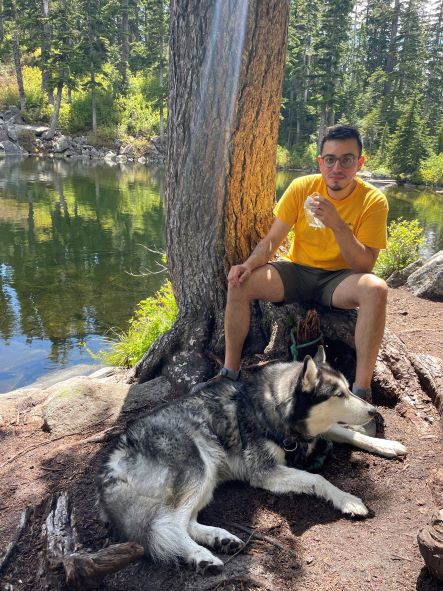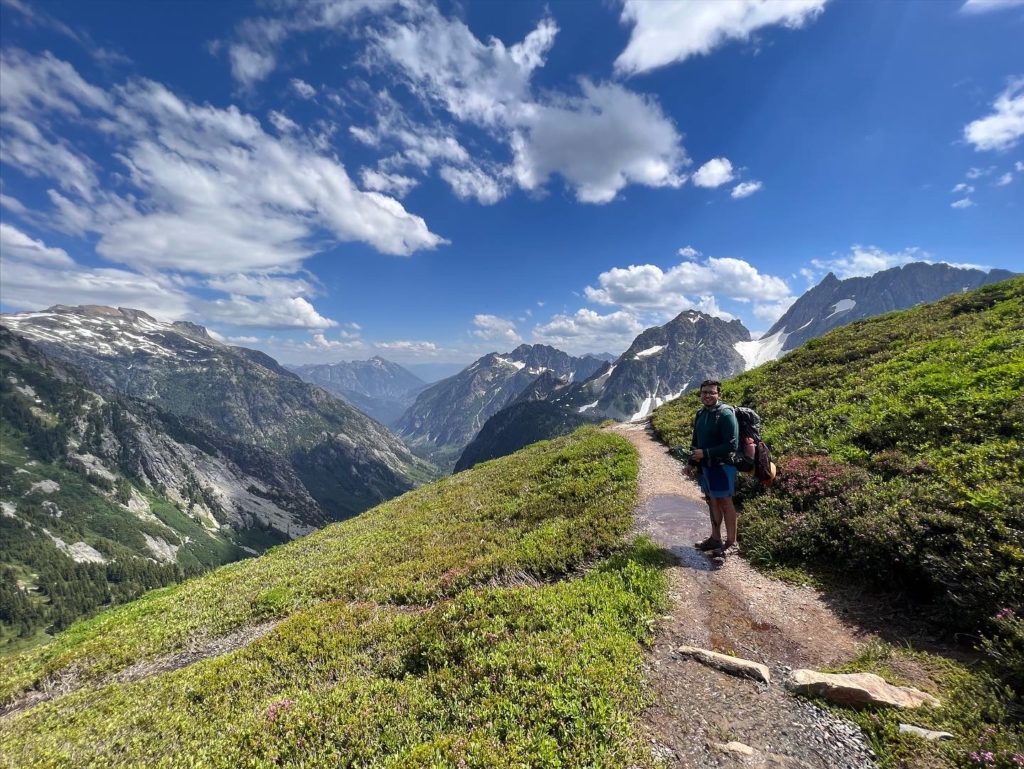Andres Guerrero-Guzman recently joined the Coalition staff as the Policy and Outreach Associate. He also currently sits on the Vamos Outdoors Project board and is the Volunteer Director of Community Engagement for Climbers of Color. Andres is a first generation Mexican American born in Bellevue, WA and grew up in Issaquah and Sammamish. He spent a lot of time during his childhood with his uncles, cousins, and extended family in Lynnwood, WA either playing soccer or barbecuing on Sundays. Andres has always been fond of being outside and as cliché as he says it is to be from WA and have the favorite color green and love fall, he embraces it — just like he embraces a pumpkin spice latte.
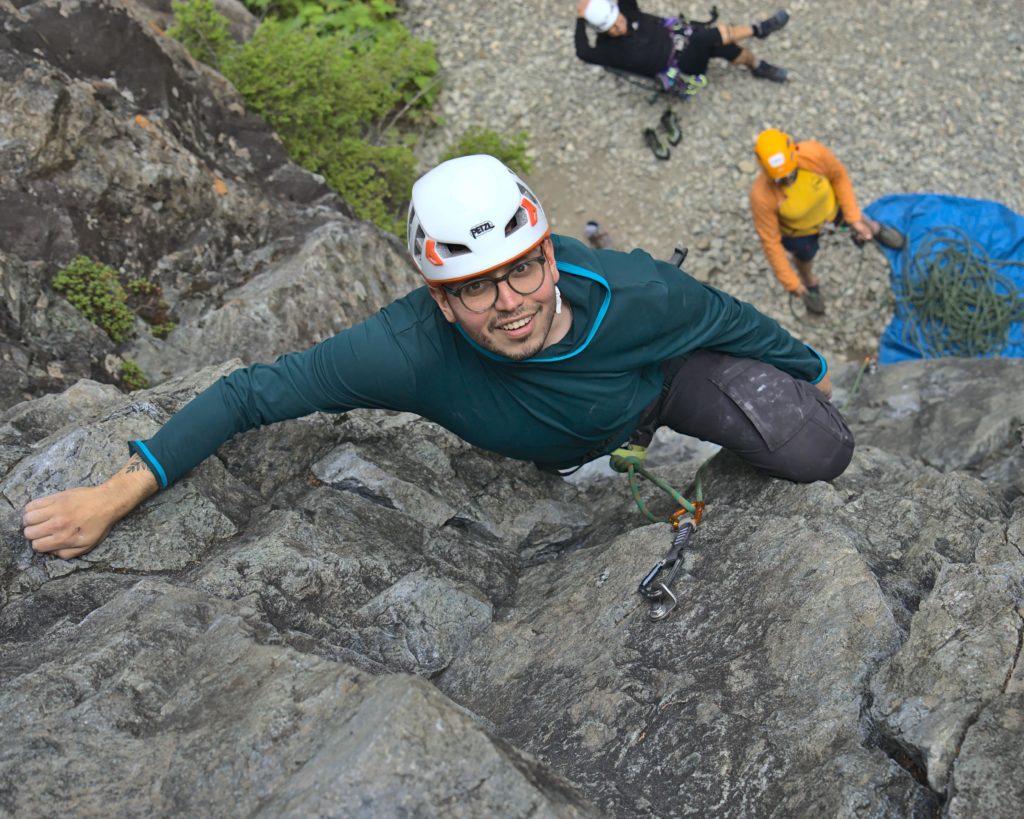
I was able to sit down with Andres during our team retreat a few weeks ago at the Rendezvous Huts, just outside of downtown Winthrop, WA and it was apparent that Andres has a deep passion for rock-climbing, equity, providing access and support to those underrepresented, and community. As we talked outside, getting peak-a-boo views of the sunlit rocks down the valley in Mazama, Andres told me why he decided to join the board of Vamos Outdoors Project, why he chose to seek out his volunteer position with Climbers of Color and what drove him to leave his Mathematics’ PhD program at the University of Washington to pursue a career in advocacy with the Coalition. He was kind enough to share with me the experiences that shaped who he is today: someone who dives headfirst into things he is passionate about while keeping equity and community at the forefront of everything he does.
The following interview has been edited and condensed for clarity
Caitie: Tell me about growing up in Washington. What did you like to do, what were you into?
Andres: I spent most of my time with family and it wasn’t until the middle of high school, where I became more independent, and got into skiing. One of my friends, who was a ski instructor at Snoqualmie Pass, offered to teach me and I was obsessed right away. I watched tutorials on YouTube to learn how improve my technical skills. I spent a lot of time that first season skiing as much as possible and I skipped school a few times. I remember one time we pulled the house landline phone out of the outlet so my parents wouldn’t get the call from school, but they noticed the phone wasn’t working and obviously found out.
Caitie: House landline, classic. We would just silence the ringer and disconnect the answering machine. Your parents are from Guadalajara, Mexico, did you grow up going to visit family in Mexico?
Andres: I would go to Colonia Santa Maria where my mom is from and stay with my grandparents every summer from June to August. It was less, I’m going for the leisure aspect, because I was going to visit family, but it was fun. I would play soccer with my cousins in these little parks, but they were not like playgrounds here in WA. They were very industrial looking–cement blocks where a lot of adults recreate.
Caitie: You have an Undergraduate Degree in Mathematics from Lewis and Clark College and Master’s Degree in Mathematics from Wake Forest University. I remember you telling me that a lot of your professors at Lewis and Clark were females and people of color?
Andres: Yes, more than half of the math department were women, which is not usually the case, and two out of six professors were women of color. We had a very diverse math department in terms of thought and people’s interests which was very cool but misleading in terms of what the future was going to bring.
Caitie: Did you dive in as quickly to rock climbing as you did with Skiing?
Andres: It was gradual at the beginning. The hardest part was that a gym membership was expensive. I didn’t know anything about climbing outside. The friend who first took me was only visiting home for a few weeks, so I didn’t have anyone to climb with. I watched a lot of climbing content on YouTube, but I didn’t know other people who rock climbed. The real diving in didn’t happen until January of 2021 when I was living with someone who was a climber.
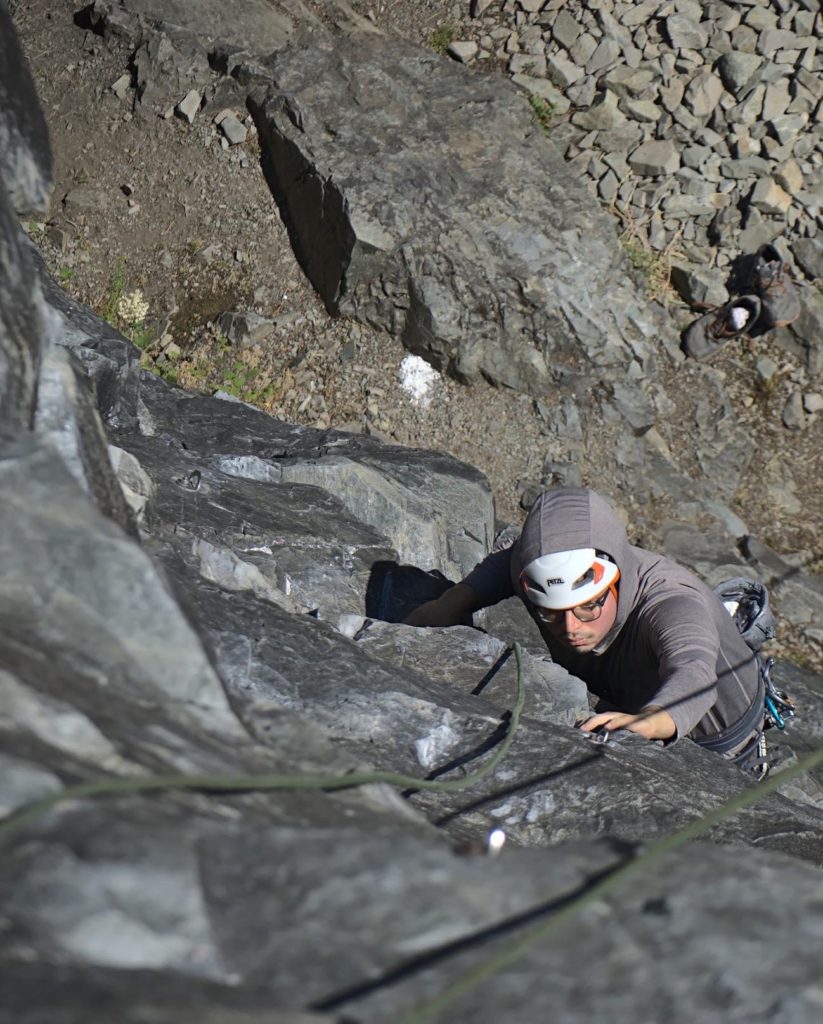
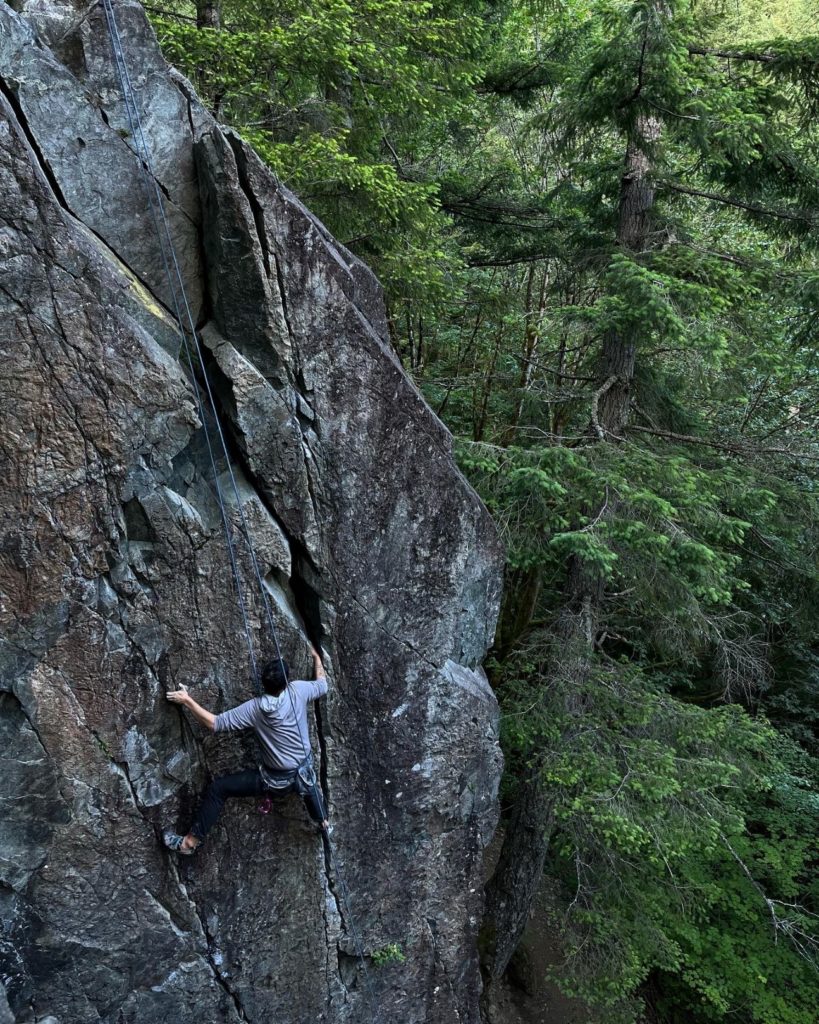
Caitie: I’ve noticed common themes about how you got into skiing and climbing. They were introduced to you by someone who was already involved in the sport, you received help with the technical aspects, and had support and a welcoming community to participate with. I think about access for others into these sports and what that can look like, and how it’s NOT just, saying ‘everyone is welcome here’ and that’s enough. What should access look like to allow someone to be successful and feel like they belong while trying something new?
Andres: I consider myself an independent person but when I really wanted to delve into climbing, I did need that support beyond the environment of ‘you’re allowed in here’. There is so much knowledge, culture, and history you have to absorb, and it can be so different than what you’re used to. My family doesn’t ski or climb, and it felt like I had to have a ‘guide’ to get into that space. I think that it’s important for new people and especially those who are not part of the dominant culture of that sport, to have someone teach you and make you feel comfortable and welcome. For me, since climbing is predominantly white, that made it more difficult for me to want to go on my own, just because walking into a room when you’re the only person of color sucks. I really liked climbing, but having to deal with that alone is hard, and sometimes that’s the difference. Having just one additional person join went a long way and made me comfortable in the space. Even now, I’m fine going to the gym by myself but it’s still uncomfortable, because you always have things in the back of your mind that you’re thinking about as a person of color.
“I think that it’s important for new people and especially those who are not part of the dominant culture of that sport, to have someone teach you and make you feel comfortable and welcome.“
Andres Guerrero-Guzman
Caitie: I’m thinking of the groups and spaces I feel more comfortable in and how important affinity groups are. You don’t have to really think about if you’re going to be the only one, you know you’re going with your group and that takes a lot of stress off mentally.
Andres: Yeah exactly, it’s a lot easier to feel safer and not have to worry about it. Things still happen when you’re in an affinity space that draw you back to reality. I took a course with Climbers of Color and a person at the crag commented ‘oh what are you all apart of?’ and it made us feel othered immediately. But for the most part affinity groups make a substantial difference because your mind can relax a bit. It’s so difficult to fully enjoy the experience because those guards have to be up for you to feel secure. It’s always been really powerful to realize, whoa, I’m not thinking about anything at all. Those affinity spaces, Climbers of Color, have always been very important to me.
“It’s so difficult to fully enjoy the experience because those guards have to be up for you to feel secure. It’s always been really powerful to realize, whoa, I’m not thinking about anything at all.“
Andres Guerrero-Guzman
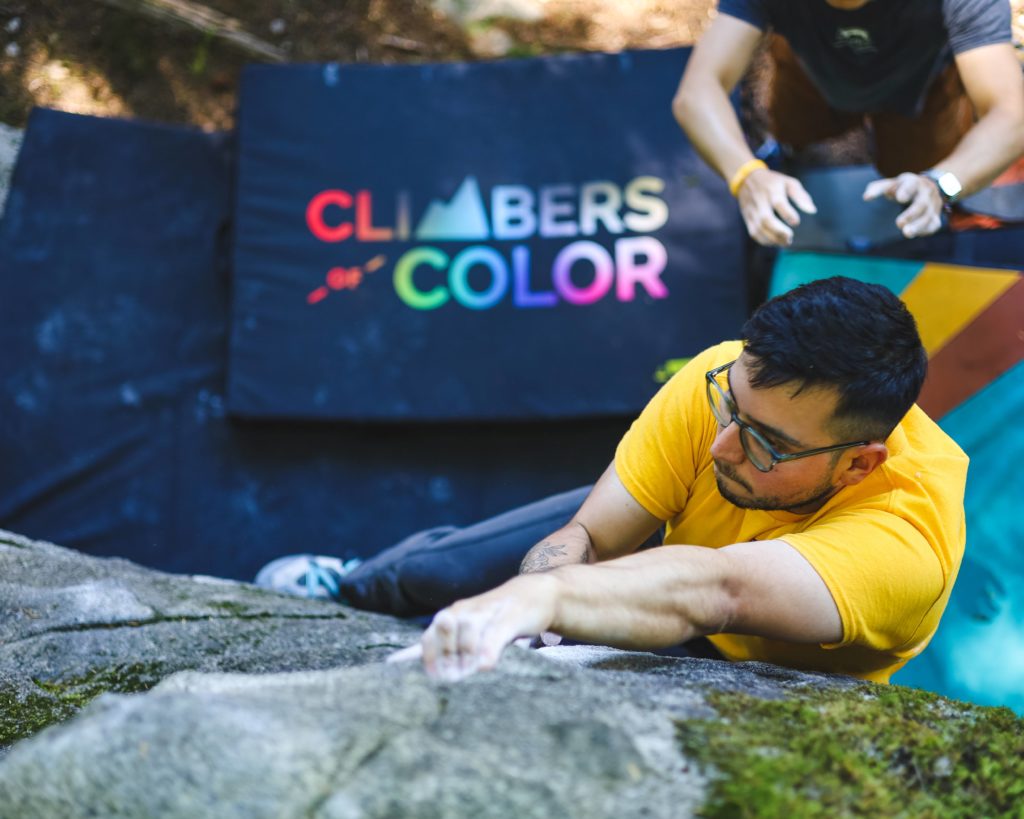
Caitie: Tell me about your volunteer Director of Community Engagement position with Climbers of Color and board seat with Vamos Outdoor Project.
Andres: I really wanted to make more of a difference in the climbing community because I was realizing the type of community I was looking for in the math world was missing and it was becoming really difficult. The volunteer work is hard and having to deal with climbing gyms who aren’t really thinking about equity but instead profit is difficult. Realizing how much of a welcoming space Climbers of Color has brought to the climbing community keeps me motivated in continuing to volunteer. I wish I had known about Climbers of Color when I first started climbing, but it was hard to think or be on the lookout for something like this because these spaces never existed for us. I decided to join the board of Vamos because they take young Latino kids out to climb and mountain bike, all of the things I didn’t get to do when I was that age. They’re providing that access, which is amazing.
“I wish I had known about Climbers of Color when I first started climbing, but it was hard to think or be on the lookout for something like this because these spaces never existed for us.“
Andres Guerrero-Guzman
Caitie: I hope this next generation growing up knows these spaces already exist. That they don’t have to go through years of feeling alone, isolated, and ‘the only one’ until they finally find their community.
Andres: I hope so too. I think social media has been an important part in getting the word out. But once you’re following those hashtags and social media accounts it feels like that’s the only world, and the reality is that there are so many people that don’t see it. It’s a conversation that our leadership at Climbers of Color often have and it’s also a conversation that we’re having about our work here at the WWRC, how do we reach people that don’t know anything about us? What the next step is, is a difficult question, but I think there is value in that people are thinking about it.
Caitie: The need of the ‘next’ step is encouraging. When did you know you wanted to transition careers from mathematics to coalition building and advocacy work?
Andres: There was so little work being done in terms of affinity spaces and creating a welcoming community in the math department and my transition away from academics was because of that. In the outdoor recreation field, there are so many affinity groups now. For me, I found that math was way behind in terms of this and the main draw of switching careers was really that it was too lonely to stay in math and do it on my own. Which was something I always sort of knew about the math community, but it really grew and I was deciding to stay or go around last year.
Caitie: What are you most excited about in joining the Coalition?
Andres: The Equity Review of the grant programs managed by RCO (Recreation and Conservation Office), this past year, has been a really cool and needed comprehensive evaluation. I have enjoyed learning about the process and the findings. The review has been leading to really good conversations and opportunities for outreach in the future. It combines my passions: equity and outreach. I’m really excited to be able to talk to communities who can benefit from outreach about the WWRP grant program and hear from the voices who want to learn more. It’s also been really engaging to meet people that have been doing the work and have been in this space for so long. The history of the program and perspective of those who were around when it was created has been awesome to learn about.
I want to send a big mahalo to Andres for taking the time to chat with me. He has jumped right into policy work at the Coalition and has quickly become a very integral part of our team. He is very busy scheduling multiple WWRP project tours with WA State Legislators and working on our 2023 policy priorities but reach out to Andres Guerrero-Guzman
